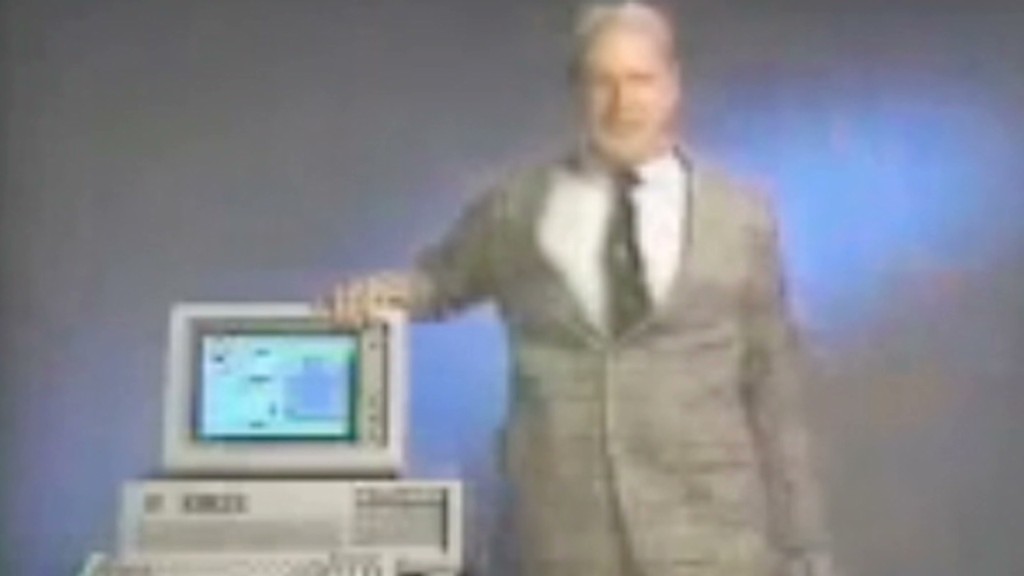
For all his charisma and enthusiasm, Steve Ballmer ultimately did not understand products.
The outgoing Microsoft CEO repeatedly failed to anticipate where the consumer technology market was headed or figure out how Microsoft (MSFT) could innovate in important areas.
That's not to say that Ballmer's tenure at Microsoft was pockmarked by bad ideas and abject failure (though the virus-filled Internet Explorer 6 and bug-ridden Windows Vista happened under his watch). The truth is that a lot of good ideas and products launched during the Ballmer era.
The problem is that many of those products and innovations came about as a desperate response to what competitors had launched. And some were missing one or two critical elements, which ended up holding them back from success.
That still rings true for Microsoft today. Consider the company's lineup of major products:
Windows 8: a reaction to its many missed opportunities in the tablet market. With PC sales sharply declining, its future success is still a big question mark.
Microsoft Surface: flawed execution and marketing confused consumers. Sales have been lackluster.
Windows Phone 8: smartphone users had already moved on to Apple's (AAPL) iPhone and Google's Android by the time it arrived.
Microsoft Office: still successful, but Google (GOOG) Docs is catching up and Microsoft knows it. Hence the release of Office 365 and its Web-based app earlier this year.
Xbox: one of the few bright spots of Microsoft's consumer facing divisions. But Microsoft's mistake-filled promotional blitz for the latest Xbox One has been a disaster.
Interactive: A tale of two Microsoft's CEOs
The next Microsoft CEO has a lot of work cut out for him or her.
If Microsoft sticks with its current plan of becoming an Apple-esque devices and services company, its new leader should probably be someone with a laser focus on product innovation (both hardware and software). If Ballmer's biggest shortcoming was ignoring the rise of mobile devices, the next CEO needs to be able to have the foresight to predict what's next, and have the skill to execute on that vision.
Another operations manager in the mold of Ballmer is not going to deliver on that.
Serving the PC market is still Microsoft's biggest cash cow, so Microsoft's next CEO shouldn't abandon that market by any means. But placing its hopes for a comeback on its past glories or even current hot tech trends will only set the company up for disappointment. It needs to look past that.
Luckily for Microsoft, the company is still in a position to succeed.
Related story: Ballmer gets no retirement pay but he's still crazy rich
One of the next big battles in tech will be control of the Internet TV space. Microsoft was smart enough to position the Xbox as an all-purpose home-entertainment device, and offer tons streaming TV, movies and music -- not just games. It also opened up a studio to develop its own TV content. If the Xbox One sells as well as its predecessor, it may end up having the type of clout Apple desires in the TV space.
Microsoft also has two wild cards in the form of Bing and Skype. Microsoft came very late to the search party and tried to fashion Bing as a search engine easy enough for dumb people, which was a mistake. But there's a second revolution happening in search. Google, Apple and Wolfram are all developing semantic search engines that attempt to figure out what he user actually wants, but none have solved the problem yet. Microsoft needs to strike while the iron is hot.
The same goes for Skype. Right now, messaging is fractured between Google Hangouts, Facebook (FB) Messenger, Whatsapp, iMessage, Line, Kik and more. Microsoft is one of the few companies to have a quality product - Skype - available on nearly every platform. Finding a way to make Skype the nexus for all of our communications is a surefire way to restore Microsoft to relevance.
Alternatively, the next Microsoft CEO could continue to chase low-hanging fruit and watch the company fade into nothingness, much like BlackBerry (BBRY) has.
MIcrosoft has a lot riding on its decision.s

